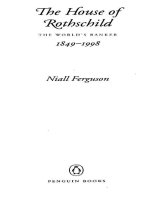Dominic lieven russia against napoleon the t ace (v5 0)
Bạn đang xem bản rút gọn của tài liệu. Xem và tải ngay bản đầy đủ của tài liệu tại đây (5.4 MB, 477 trang )
Russia Against Napoleon
DOMINIC LIEVEN
Russia Against Napoleon
The True Story of the Campaigns of War and Peace
VIKING
VIKING
Published by the Penguin Group
Penguin Group (USA) Inc., 375 Hudson Street, New York, New York 10014, U.S.A.
Penguin Group (Canada), 90 Eglinton Avenue East, Suite 700, Toronto, Ontario, Canada M4P 2Y3 (a
division of Pearson Penguin Canada Inc.)
Penguin Books Ltd, 80 Strand, London WC2R 0RL, England
Penguin Ireland, 25 St. Stephen’s Green, Dublin 2, Ireland (a division of Penguin Books Ltd)
Penguin Books Australia Ltd, 250 Camberwell Road, Camberwell, Victoria 3124, Australia (a
division of Pearson Australia Group Pty Ltd)
Penguin Books India Pvt Ltd, 11 Community Centre, Panchsheel Park, New Delhi – 110 017, India
Penguin Group (NZ), 67 Apollo Drive, Rosedale, North Shore 0632, New Zealand (a division of
Pearson New Zealand Ltd)
Penguin Books (South Africa) (Pty) Ltd, 24 Sturdee Avenue, Rosebank, Johannesburg 2196, South
Africa
Penguin Books Ltd, Registered Offices:
80 Strand, London WC2R 0RL, England
First American edition
Published in 2010 by Viking Penguin,
a member of Penguin Group (USA) Inc.
Copyright © Dominic Lieven, 2009
All rights reserved
LIBRARY OF CONGRESS CATALOGING IN PUBLICATION DATA
Lieven, D. C. B.
Russia against Napoleon: the true story of the campaigns of War and Peace / Dominic Lieven.
p. cm.
Includes bibliographical references.
ISBN: 1-101-42938-0
1. Napoleonic Wars, 1800–1815—Campaigns—Russia. 2. Russia—History—Alexander I, 1801–
1825. 3. Tolstoy, Leo, graf, 1828–1910. Voina i mir. I. Title.
DC235.L49 2009
940.2'70947—dc22
2009042564
Without limiting the rights under copyright reserved above, no part of this publication may be
reproduced, stored in or introduced into a retrieval system, or transmitted, in any form or by any
means (electronic, mechanical, photocopying, recording or otherwise), without the prior written
permission of both the copyright owner and the above publisher of this book.
The scanning, uploading, and distribution of this book via the Internet or via any other means without
the permission of the publisher is illegal and punishable by law. Please purchase only authorized
electronic editions and do not participate in or encourage electronic piracy of copyrightable
materials. Your support of the author’s rights is appreciated.
For my courageous wife, Mikiko, and in memory of the regiments of the Imperial Russian Army who
fought, suffered and triumphed in the great war of 1812–14
Contents
List of Illustrations
List of Maps
Acknowledgements
A Note on the Text
1 Introduction
2 Russia as a Great Power
3 The Russo-French Alliance
4 Preparing for War
5 The Retreat
6 Borodino and the Fall of Moscow
7 The Home Front in 1812
8 The Advance from Moscow
9 1813: The Spring Campaign
10 Rebuilding the Army
11 Europe’s Fate in the Balance
12 The Battle of Leipzig
13 The Invasion of France
14 The Fall of Napoleon
15 Conclusion
Appendix 1:
The Russian Army in June 1812
Appendix 2:
Russian Army Corps at the beginning of the autumn 1813 campaign
Notes
Bibliography
Additional Reading in English
Illustrations
Alexander I
Mikhail Barclay de Tolly
Mikhail Kutuzov
Levin von Bennigsen
Peter von Wittgenstein
Petr Rumiantsev
Karl von Nesselrode
Aleksandr Chernyshev
Christoph von Lieven
Mikhail Speransky
Aleksei Arakcheev
Dmitrii Gurev
Fedor Rostopchin
Petr Bagration
Mikhail Miloradovich
Matvei Platov
Eugen of Württemberg
Petr Volkonsky
Aleksei Ermolov
Karl von Toll
Johann von Diebitsch
Aleksandre de Langeron
Fabian von der Osten-Sacken
Ilarion Vasilchikov
Johann von Lieven
Aleksei Gorchakov
Dmitrii Lobanov-Rostovsky
Georg Kankrin
Andrei Kologrivov
Private: Preobrazhensky Guards Regiment
Private: Finland Guards Regiment
Private: Riazan Infantry Regiment
Lieutenant: field artillery of the line – heavy battery
Private: Ekaterinoslav Cuirassier Regiment
Lieutenant: Guards Dragoon Regiment
Private: Sumi Hussar Regiment
Private: Lithuania Lancer Regiment
Napoleon awards the Légion d’honneur to Private Lazarev at Tilsit
Borodino: the Raevsky Redoubt after the battle
Spring 1813: the Cossacks in Hamburg
Fère-Champenoise: the Cossack Life Guard Regiment attacks the French infantry
Picture credits:
George Dawe painting, Bridgeman Art Library/Getty Images
Christoph von Lieven: British Library
Aleksei Arakcheev: British Library
Alexandre de Langeron and Fabian von der Osten-Sacken: British Library
Andrei Kologrivov: British Library
Albrecht Adam sketch: AKG Images
V. Bezotosny
Don Cossack Life Guard Club/Courbevoie
Maps
1 The Campaign of 1812
2 The Campaign of Autumn 1813
3 Europe in May 1812
4 The Smolensk Region
5 The Borodino Battlefield
6 The Crossing of the Berezina
7 The Campaign of Spring 1813
8 The Battle of Bautzen
9 The Battle of the Katzbach
10 August 1813: The Dresden Campaign
11 The Battle of Kulm
12 The Leipzig Campaign
13 The Battle of Leipzig
14 North-Eastern France
15 The Paris Region
Acknowledgements
So many people and institutions helped me to research and write this book that in normal
circumstances it would be difficult to know where to start with my thanks. But the help of one
institution, the Leverhulme Trust, was so fundamental that beyond question it must come first. In 2006
I was awarded a Leverhulme Major Research Fellowship, which left me free to work on my book for
the next two years and also funded most of my research in the Russian archives. I owe a huge amount
to the generous support of the Trust. Professors Paul Bushkovitch, William Fuller and Geoffrey
Hosking supported my application for the fellowship, and to them too I owe many thanks.
In the summer of 2006 I had a two-month fellowship from the British Academy which enabled
me to work in the Slavic Library in Helsinki. During these two months I was able to read all the
regimental histories of Russian units which participated in the Napoleonic Wars. I also read or at
least copied all the journal articles published in Russia before 1917 which were relevant to my topic.
For any historian of imperial Russia the Helsinki Library is a unique asset, made all the better by the
friendly and efficient help of its staff, led by Irina Lukka. My deep thanks are owed not just to Irina
but also to Ulla Tillander, who helped so much to organize my expedition and make it pleasant.
Richard Stites and the community of historians working in the Library were also very kind to me.
One part of the Russian State Military Historical Archive’s (RGVIA) holdings on the
Napoleonic Wars was microfilmed shortly before I began my research. This is Fond 846, the socalled Voenno-uchenyi Arkhiv (VUA). As anyone looking at my references will see, it contains
priceless information for my book. The Librarian of the LSE Library (BLPES), Jean Sykes, and the
Library’s main Russian specialist, Graham Camfield, acquired this immensely valuable collection,
and left me for ever in their debt.
Even so, the main archival sources for my book had to come from holdings in the Russian State
Military Historical Archive (RGVIA) in Moscow other than the VUA. Above all these were the
papers of the wartime recruit levies (Fond 1), most of the materials relating to the feeding, equipment
and arming of the field armies (Fond 103), the documents of the Reserve Army (Fond 125), and the
immensely useful personnel records of Russian regiments (Fond 489). Thanks to Tatiana Iurevna
Burmistrova and the staff of RGVIA, I was able to get through all the materials I needed during my six
research trips to Moscow.
I would never have been able to do so, however, without the help of Vasili Kashirin. My
research was complicated by family needs and by the fact that for part of this time the archive closed
for repairs, sometimes with minimal notice. Without Vasili’s help in finding materials and ensuring
that I received them this book would be much weaker than it is. More than any other individual, he
made an enormous contribution to my research. A number of archivists also deserve my special
thanks, and not least Aleksandr Kapitonov. Professor Apollon Davidson and his wife Liudmilla
kindly put me up in Moscow on a number of occasions and coped with my grumpiness when
something went wrong with the archive.
I owe a big debt to the friends who took me to battlefields. Viktor Bezotosnyi showed me the
field at Maloiaroslavets, and was also a constant source of advice, information and friendship. Paul
Simmons and Vasili Kashirin spent a memorable day at Borodino with me. Dominic Herbestreit and
Christin Pilz took me around the battlefields of Leipzig and also drove me to Kulm, now in the Czech
Republic. Even more heroic was my sister, Professor Elena Lieven, who drove me deep into rural
Poland to the battlefield of the Katzbach. Our expedition was helped hugely by Alexandra Porada,
who helped us negotiate the area.
My agent, Natasha Fairweather, has been a key ally and so have my publishers, Simon Winder
and Wendy Wolf, as well as Alice Dawson and Richard Duguid of Penguin. Elizabeth Stratford was
an exceptionally efficient copy-editor. I have wanted to write this book since childhood but they
encouraged me to do so. I think that the initial spur to write the book in time for the bicentenary in
2012 came, however, from my colleague, Professor James Hughes.
Among others at LSE who helped me enormously, Sue Starkey stands out. She coped with my
frequent hysteria when confronted by computers, photocopiers and other technological challenges.
Her colleagues in the Government Department’s General Office (Jill Stuart, Cerys Jones, Madeleine
Bothe, Hiszah Tariq) also helped me and calmed me down. My colleague, Professor Janet Hartley,
very kindly read the text for me and suggested changes. So too did our students, Conor Riffle and
Megan Tulac. In my first twenty-four years at LSE I kept as far from the School’s management as
possible. While working on this book, however, I was initially head of department and subsequently a
member of LSE’s governing council. That gave me some insight into the intelligent, efficient and
good-humoured manner in which the School was run by (Sir) Howard Davies, its director. Tony
(Lord) Grabiner, chairman of the Board of Governors, showed not just wisdom but great
unselfishness, devoting an immense amount of his time to unpaid service to the School to a degree that
few members of the academic community realize.
I must also thank Professor Patrick O’Brien for his advice on war, finance and economic issues,
and Alexis de Tiesenhausen for his help and advice as regards illustrations.
For the first eighteen months of my research I lived mostly off the excellent holdings of the
British Library and owed much to the help of its staff. After joining the London Library halfway
through my research, I discovered just how splendid a resource it is for scholars in general and
historians of imperial Russia in particular.
I published an article outlining the theme and purpose of this book in Kritika in spring 2006 and
would like to thank the editors of the journal and readers of the piece for their useful criticism and
advice.
My family – Mikiko, Aleka, Max and Tolly – suffered during my research and writing of the
book but helped to keep me going.
A Note on the Text
In the era covered by this book Russia ran on the Julian calendar, which in the nineteenth century was
twelve days behind the Gregorian calendar used in most of the rest of Europe. The events covered by
this book occurred partly in Russia and partly abroad. To avoid confusion, I have used the Gregorian
– i.e. European – calendar throughout the text. Documents are cited in the notes in their original form
and when they have dates from the Julian calendar the letters OS (i.e. Old Style) appear after them in
brackets.
I have used a modified version of the Library of Congress system for transliterating words from
Russian. To avoid bewildering anglophone readers I have not included Russian hard and soft signs,
accents or stress signs in names of people and places in the text. A point to note is that the Russian e
is usually pronounced ye. Sometimes, however, the e is accented and stressed, appearing in Russian
as é. In this case it is generally pronounced as yo, though after some consonants as just o. Among
words frequently found in this book, for example, are Petr (i.e. Peter) which is pronounced Pyotr,
Potemkin which is pronounced Patyomkin and the Semenovsky Guards Regiment, which is
pronounced Semyonovsky. The surname of Aleksandr Chernyshev, who figures prominently in this
story, sounds like Chernyshoff in English. Very many Russian surnames end like an adjective in the
letters -ii but in deference to English custom I use the letter -y. Thus the reader will come across, for
example, Petr Volkonsky, who served as Alexander’s chief of staff, not the grammatically more
correct Volkonskii.
When faced with surnames of non-Russian origin I have tried – not always successfully – to
render them in their original Latin version. My own name thereby emerges unscathed as Lieven rather
than depressed and reduced as Liven. As regards Christian names I also transliterate for Russians but
in general use Western versions for Germans, Frenchmen and other Europeans. So Alexander’s chief
of staff is called Petr Volkonsky but General von der Pahlen is rendered as Peter, in deference to his
Baltic German origins. No system is perfect in this respect, not least because members of the Russian
elite of this era sometimes spelt their own names quite differently according to mood and to the
language in which they were writing.
Where an Anglicized version of a town’s name is in common use, I have used it. So Moscow
rather than Moskva burns down in this book. But other towns in the Russian Empire are usually
rendered in the Russian version, unless the German or Polish version is more familiar to English
readers. Towns in the Habsburg Empire and Germany are usually given their German version of a
name. This is to simplify the lives of baffled readers trying to follow the movements of armies in texts
and maps, though when any doubts might exist alternative versions of place names are given in
brackets.
The names of Russian regiments can also be a problem. Above all this boils down to whether or
not to use the adjectival version (i.e. ending in -skii) as in the Russian. I prefer Moscow Regiment –
to take one example – rather than Moskovskii Regiment but I make some exceptions for the Guards.
The senior Guards infantry regiments, for example, were named after obscure villages outside
Moscow. It makes far more sense to render them in their habitual adjectival form: in other words
Preobrazhensky Guards rather than Preobrazhenskoe. Where confusion might occur the alternative
variants of the regiment’s name are placed in brackets: so, Lithuania (Litovsky) Guards. I have also
accepted tradition in using the habitual French version – Chevaliers Gardes – rather than the Russian
Kavalergardsky for this regiment and by referring to the Cossack Life Guards.









